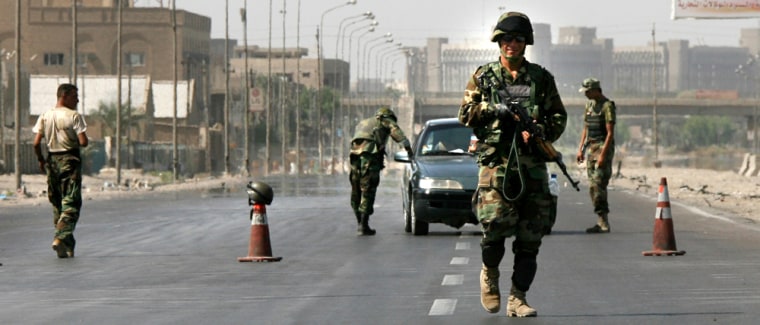U.S. troops detained a bodyguard for the leader of Iraq’s biggest Sunni Arab political group on suspicion the guard was preparing suicide bombings, and fearful officials on Saturday enforced a total ban on movement in this city of about seven million people.
The U.S. command said the man was believed to be a member of al-Qaida in Iraq and was preparing a series of suicide attacks inside the heavily fortified Green Zone, home to the Iraqi government, parliament and the U.S. and other western embassies.
Khudhir Farhan was taken into custody Friday at the home of Adnan al-Dulaimi, the head of the largest Sunni Arab bloc in parliament, al-Dulaimi told The Associated Press.
“Credible intelligence indicates the individual, a member of Dr. Dulaimi’s personal security detachment, and seven members of the detained individual’s cell were in the final stages of launching a series of (car bomb) attacks inside the International Zone, possibly involving suicide vests,” the U.S. military said in a statement without identifying the man by name.
He is suspected of having links to a car bomb network operating in the southern area of Baghdad, the military said.
Immediately after the arrest Friday afternoon, al-Dulaimi denied that the guard had terrorist links. But when contacted by the AP on Saturday he said: “That individual joined my residence as a guard no more than a month ago, therefore I haven’t got complete data about his background.”
“Anyhow, they are only suspicions about his involvement, which have not been proved,” al-Dulaimi said.
Sunni leader was cooperative
The U.S. military said al-Dulaimi cooperated with soldiers when they showed up to apprehend the guard.
“This operation in no way implies Dr. al-Dulaimi was associated with any illegal activity; he was not the target in this operation,” the U.S. command said in a statement.
Following the Friday raid on al-Dulaimi’s house, the Iraqi government ordered a complete lockdown inside Baghdad — banning all pedestrian and vehicular traffic until Sunday morning. Such bans have been imposed in the past following fears that car or suicide bombs were planned.
The curfew was put into place on the advice of U.S. forces, Interior Ministry spokesman Brig. Abdul-Kaim Khalaf told the AP.
“They have information terrorists entered Baghdad,” Khalaf said. “The prime minister agreed to (the curfew) to give our security forces the freedom of movement to raid certain places.”
Though the capital was quiet because of the curfew, six people were killed in scattered violence around the country, including an Iraqi working as an interpreter for the U.S. military in an area about 60 miles south of Baghdad, authorities said.
In addition, Baghdad police found 10 bodies in Baghdad, apparently victims of sectarian death squads. Two other bodies were turned in to the morgue in Kut, 100 miles southeast of Baghdad.
The U.S. military has forecast a surge in violence during the Muslim holy month of Ramadan, which began about a week ago. A senior U.S. military official said the first week of Ramadan was the worst for suicide bombings since the U.S.-led invasion in 2003.
A preventative move
Speaking on Al-Arabiya TV on Saturday morning, Interior Ministry official Hussein Ali Kemal said the move was to “prevent the security situation from deteriorating.”
“That was done due to intelligence information that indicates the intentions of the terrorists to commit terrorist acts against civilians, therefore it is a measure for maintaining the safety and security of the people,” he said.
He added, however, that the information was that there was a threat that an attack “might occur against places of worship and shopping centers during Ramadan.”
On Saturday, U.S. Embassy in Baghdad spokesman Lou Fintor declined to comment on reports that American officials have warned Iraqi leaders that they might have to curtail aid to the Shiite-controlled Interior Ministry because of human rights violations.
According to The New York Times, the focus centers on allegations of abuse and torture at an Interior Ministry prison in Baghdad known as Site 4.
More Saddam trial violence
The curfew also came shortly after a relative of the new presiding judge in Saddam Hussein’s genocide trial was shot and killed in Baghdad, an attack condemned by the country’s top prosecutor as an attempt to force the trial to be moved out of Iraq.
Prosecutor General Jaafar al-Mousawi said the attack on a car carrying the judge’s brother-in-law and nephew, the latest in a string of violence linked to proceedings against the former Iraqi leader, would not stop the court from moving ahead. During Saddam’s first trial, three defense lawyers were killed, and a fourth fled the country in fear for his life.
It was unclear whether Judge Mohammed Oreibi al-Khalifa’s relatives were targeted because of his role in the trial, or if the shooting was just another of the sectarian attacks that have been plaguing Baghdad.
